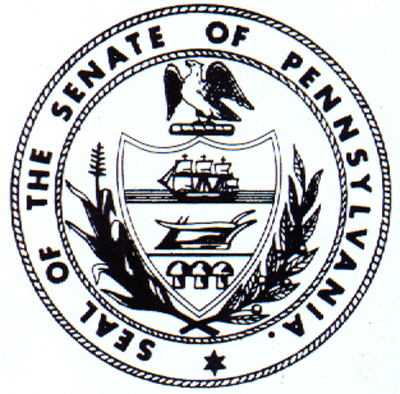|
|
||||||
CONTRARY TO PMA COMPLAINTS, PENNSYLVANIA HAS GOOD BUSINESS CLIMATE HARRISBURG, July 25, 2006 -- State Senator Vince Fumo (D-Philadelphia) issued the following statement today in response to a press release last week from the Pennsylvania Manufacturer's Association: # # # Once some people start receiving help from the government, they never seem to be satisfied unless they get more. Take, for example, the Pennsylvania Manufacturers Association. In a July 17 press release, the PMA complained about the level of spending in the fiscal year 2006-07 state budget. The PMA and some of its allies argued that what we needed instead was more tax reduction for business, suggesting that Pennsylvania’s economy was moribund and uncompetitive. And so continues the perpetual wolf-cry from certain segments of the business community, always howling that nothing is more important to Pennsylvania than more and more business tax cuts. Listen to them year after year, and you would think that Pennsylvania is an oppressive and tyrannical business-tax purgatory where it is nearly impossible for anyone to make a buck. Not only is this a misleading and outdated view of our state, but it actually works contrary to the long range interests of the business community that PMA purports to serve. It hurts the overall image of Pennsylvania, which in turn damages the opportunities for our state’s businesses to grow and succeed. It also overlooks the key fact that most of Pennsylvania’s new spending will greatly assist business productivity, because it is an investment in the children who will be the future leaders and workers in our economy. After years of business tax cuts in the Ridge-Schweiker administration and the continuation of pro-business policies (with additional tax cuts) from the Rendell administration, the PMA should stop agitating for more feed in its trough, and should start spreading the good news about Pennsylvania’s business climate. And good news abounds. The truth is, Pennsylvania ranks well above the national average in several credible, independent rankings of the best states to do business. According to Site Selection Magazine, the industry bible for executives who make decisions on business location, Pennsylvania had the 15th best overall business climate among the 50 states as of 2005. The Tax Foundation, a 70-year-old nonpartisan tax policy study organization, ranks Pennsylvania’s business tax climate as the 16th best among the 50 states in 2006. The Corporation for Enterprise Development, another national group, says Pennsylvania is the 6th highest state for job growth attributable to new companies, thus belying the notion that this is a bad place to try to start a new business. CFED also ranks us 14th in venture capital investment. Beacon Hill Institute, an economic policy study center at Suffolk University, ranks Pennsylvania No. 11 among states for competitiveness in the technology sector. The PMA chooses to disregard all of this evidence that Pennsylvania is a business-friendly state. Similarly, it ignores the good news when discussing tax cuts. The recently passed budget cuts taxes by $118 billion. (Next year, those taxes cuts will be worth $200 million.) The PMA press release says there was only “incremental progress” made toward tax relief, and notes that “beyond the one mill reduction in the Capital Stock and Franchise Tax already in law, the budget included roughly $78 billion in business tax relief.” But why not include the already scheduled reduction in the CS&F Tax? That is revenue that the state will lose from its 2006-07 budget -- $217 million. Adding that to the $118 million produces an overall tax reduction this year of $335 million. Of that, $304 million, or 91 percent, goes to business. When you analyze PMA’s complaint that $425 million of the state’s 2005-06 revenue surplus of $864 million comes from business, it is obvious that, once again, business got a good deal. While providing just 49 percent of the budget surplus, it received 91 percent of the tax relief. PMA argues that the spending levels in this budget will require a future tax increase, but that defeats its own argument for more tax cuts this year. Why lower taxes this year if we have to increase them even more in 2007? Businesses deserve predictable and stable tax rates. Indulging in yo-yo rate increases and decreases is not good budgeting practice. While it is by no means certain that we will have to increase taxes next year, PMA shouldn’t advocate for additional tax cuts this year if it is truly worried. One other point on taxation: Data from the Federal Tax Administration indicates that of the 41 states which levy a personal income tax, Pennsylvania has the 40th highest rate – next to the lowest. Considering that most small businesses pay the PIT rate rather than the Corporate Net Income Tax, that statistic also suggests that our state’s business tax climate is not nearly as bad as PMA would have us believe. Then there are PMA’s gripes about the level of spending increases. Yes, spending has increased under the Rendell administration, but most of that is attributable to the gains in basic education funding. That is an investment in the future of the Commonwealth, and nothing is more important to the success of business than a well educated workforce. This year's unprecedented $265 million increase in the basic education subsidy continues the commitment by the Rendell Administration and the General Assembly to significantly increase state aid to local school districts. The basic subsidy increase was the largest component of a $591 million, 8.1 percent increase in support for school districts. Following a decade of eroding state support, the state share of local school district funding has risen steadily during the past few years, reaching an estimated 37.4 percent following enactment of this year's budget. When the anticipated slots revenue pledged for property tax relief is fully phased in, the state share of local school district funding is estimated to rise above 42 percent. PMA should recognize that government provides valuable services which help the business community as well as individuals. Education is a prime example. PMA should realize, as any smart business person does, that if you are going to be successful not just today but also tomorrow, you have to invest in your future.
|


